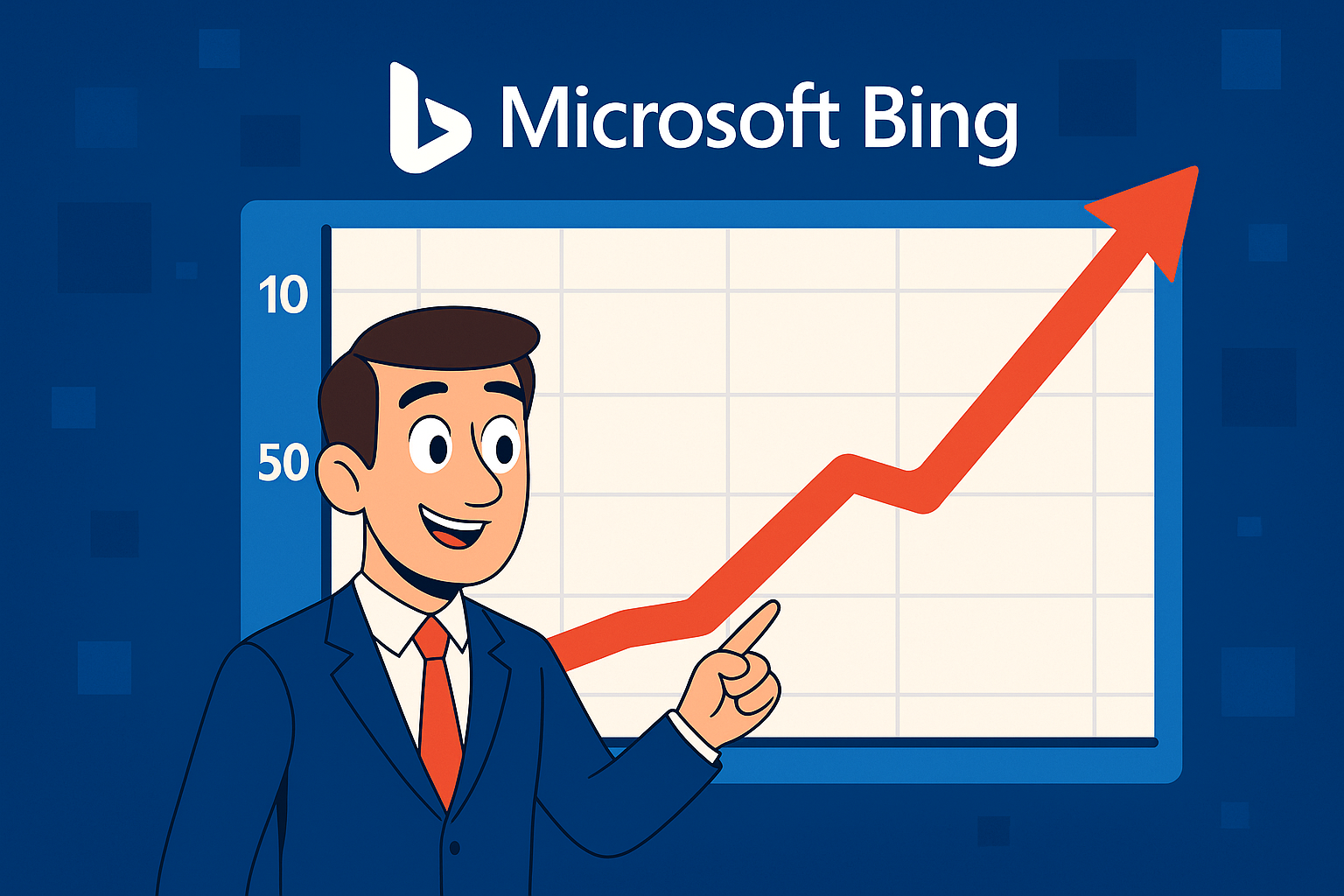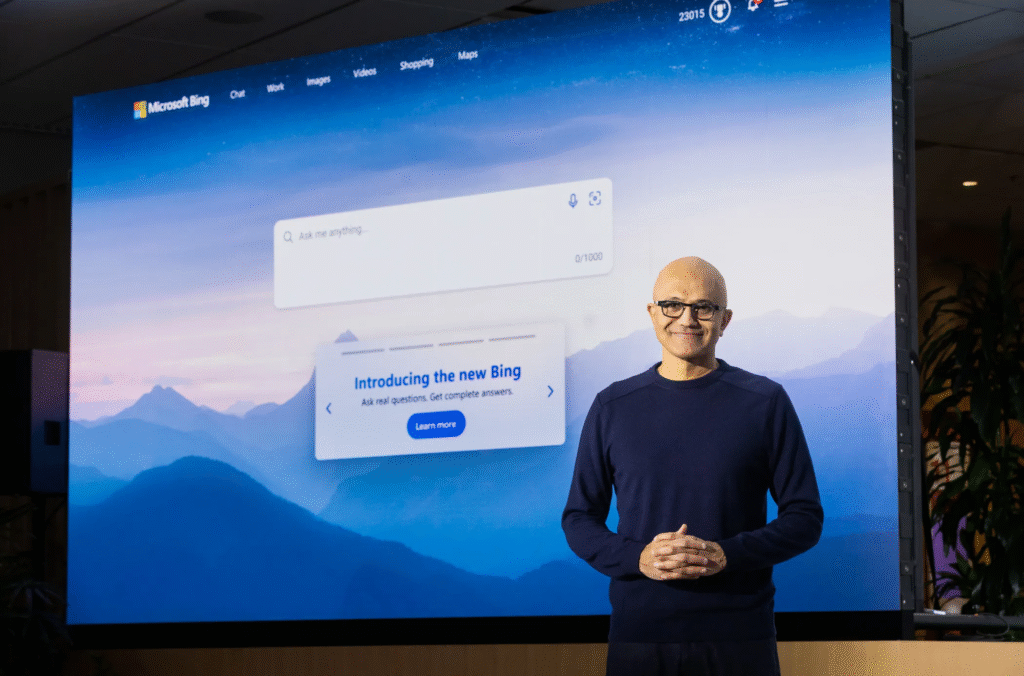Physical Address
304 North Cardinal St.
Dorchester Center, MA 02124
Physical Address
304 North Cardinal St.
Dorchester Center, MA 02124

When you hear “search engines,” your mind likely yells out “Google!”—and deservedly so, it’s been on top for decades. Something strange is occurring, however. A stealthy contender has been gaining momentum in the shadows: Microsoft Bing. Now AI-powered, this is no longer a secondary choice—it’s becoming a contender in the tech world. As a fan of delving deep into how tech giants change gears and break new ground, I had to investigate further.
Let’s break down why Bing is gaining traction, why it’s making real bites out of Google’s share, and where it can go in the next 5–10 years.
Microsoft Bing has forever operated in Google’s shadow. For years, the browser that just shipped with your PC—used solely to download Chrome—had been the perception of Bing. But Bing Traffic has jumped leaps and bounds recently, particularly since Microsoft began incorporating advanced AI tools into its foundation. I was actually surprised to hear that Bing hit 100 million daily active users shortly after releasing its AI-driven experience.

This is not a tiny victory. This is a huge indication that individuals are receptive to new, intelligent manners of searching. Due to this leap in use, Microsoft is not simply burnishing its brand—it’s reshaping its place within the technology ecosystem. Bing is transcending being a search engine; it’s an AI ally for the web.
What I think is genius about it is how well it integrates into Microsoft’s entire ecosystem. If you’re using Windows, Microsoft Edge, or even software like Word and Excel, Bing is so integrated that it becomes your everyday workflow. Want to do a search while typing out a document? Bing is there. Want to create AI-driven content or a summary? Bing once more.

This indigenous integration provides it with a strategic edge over Google. While Google enjoys supremacy over Android, Microsoft is taking the long-term approach to developing more intelligent features throughout its productivity suite, all fueled by Bing AI. It’s not convenience—it’s knowing intelligent automation at your fingertips.
Microsoft didn’t simply put a chatbot in Bing—it completely revamped the search experience. With the addition of ChatGPT-like capabilities, This AI can now have actual conversations, respond to in-depth questions, and even write your next blog opening (don’t ask me how I tested it). This isn’t a search engine anymore—this is a real-time aide.
The following are things that Bing AI can now assist users with:
The investment in OpenAI wasn’t a flashy tech play—it was a strategic blow to disrupt the way we interact with the internet.
Those are not the days when it used to just spit out a list of links. The Bing Search experience today features visual results, voice-based interaction, and context awareness. Ask it a complex question, and it doesn’t simply spit out articles—it summarizes them, explains them, and allows you to ask follow-ups in a natural way.

It’s genuinely refreshing to work with a search engine that acts more like a research collaborator than a simple answer box.
Let’s discuss numbers—and no, they’re not dull. Since the introduction of AI-driven Bing, Microsoft experienced an enormous jump in user retention and engagement. More users are querying for longer periods and returning every day. People aren’t doing it once and leaving it, it’s becoming routine.
What is fueling the Bing traffic increase?
It’s still got a way to go, but it’s no longer an underdog—it’s a true contender.
Now let’s get real—Google is still the behemoth. It controls well over 90% of world search traffic. But it is steadily and incrementally clawing its way into that dominance, especially in North America and Europe. Microsoft is innovating while Google is catching up with innovations such as Gemini and Search Generative Experience (SGE).

If it continues to attack at this pace, I would not be surprised if it captures 10–15% of world-wide search share in the near future.
I enjoy predicting, so here is mine: It will evolve into a proper AI-first platform. Not only a search engine but a multi-purpose productivity, research, writing, and more hub. I envision Bing integrated into devices, apps, and voice assistants in homes and offices all over the world.

Here’s what I foresee from it by 2030:
The future Bing is far more than a search box.
If you’re fed up with dull, stodgy search engines. It provides a next-generation, AI-based experience that marries search with actual productivity tools. If you’re a technophile, an author, or simply someone who desires bright results quickly, It is worth paying attention to. I never thought I’d be saying this—but I’m hoping for it.
Share your details, and we will get back to you shortly!
This will close in 0 seconds
Share your details, and we will get back to you shortly!
This will close in 0 seconds